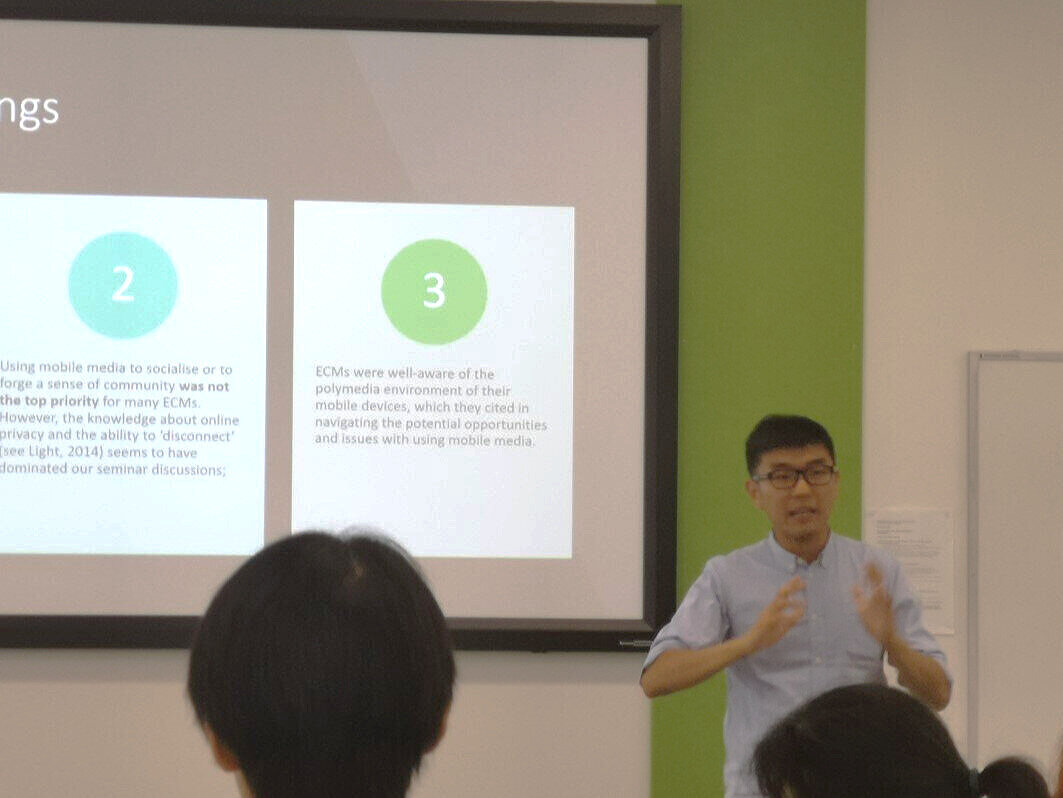Keynote presentation - Learning to be digital
This study uses a self-reflexive and participant-driven approach to explore mobile media use amongst older Chinese migrants (OCMs) in Melbourne, Australia. Over the past two years, I have volunteered at a Chinese senior association in Melbourne by running seminars that discuss and help ECMs with their mobile media uses. It is through this experience I have come to realise that ‘digital’ is not a state of being; for many older migrants, digital is a process of becoming, which is socially constructed, negotiated, and imagined. In a diasporic context, becoming or attempting to become digitally proficient expresses OCMs’ desires and wishes of living at a new place and on a transnational cultural scale. The present article here reports on some observations and reflections made from the early stages of the study, which is still work-in-progress. The methodology section will discuss the potential methodological development(s) of the study rather than a review of a set of completed research activities. Through emphasising on the agency and cultural subjectivity of the ECMs, the study can potentially contribute to the conceptualisation of digital media use in later life on the one hand, and the methodological design for mobile media research on the other.
From the left: Dr Xinyu Andy Zhao, Dr Xu Chen, Dr Wilfred Yang Wang, and Dr Yanan Jana Yang
PANEL: ONLINE TRUST IN THE CONTEXT OF GLOBAL MIGRATION: MOBILITY, SOCIALITY, AND THE PRODUCTION OF CHINESE DIASRPOIC SUBJECTIVITY IN AUSTRALIA
Digital media has now well-integrated into the journey of migration. New communication and media technologies have shaped migrants’ sense of self and belonging, reconfigured their experience of geo-mobility, and enabled a new mode of sociality and cultural imaginary. Chinese migrants in Australia embody these qualities not only Chinese is one of the largest ethnic communities in Australia, but the recent waves of immigration from China coincided with the rise of the Chinese-language digital platforms and China-based technological enterprises. Unlike their predecessors who had limited choice of Chinese language content, the media consumption and mode of communication of today’s Chinese migrants have become more abundant, flexible, and personalised.
The three papers are then, organised to explore the transnational characters of Chinese migrants’ lives in Australia, from financial and economic survival to dating and socialisation, and the re-exploration of selfhood and belonging at later life. The papers draw on different research methods range from ethnographic interviews and participant observation, to the walkthrough method and interface studies, and to the researcher embedded approach, to form critical inquiries about the production of trust in a digital era from the perspective of transnational migrations.
Paper 1: Practising daigou on social media: Building trust and negotiating privacy in transnational entrepreneurship
Dr Xinyu Andy Zhao
Paper 2: A cross-cultural analysis on authenticity framing of dating apps Tinder and Tantan
Dr Xu Chen
Paper 3: Building trust in a transnational aging context: older Chinese migrant’s WeChat use in Australia
Dr Wilfred Yang Wang & Dr Yanan Jana Yang
Crossroad Cultural Studies Conference Sydney December 2016
Presentation 17 December 2016 (photo by Dr Crystal Abidin)
The concept of ‘minjian society’ has become a core conceptual framework of my book Digital Media in Urban China Locating Guangzhou. This was the first time I present my early ideas about using ‘minjian society’ to examine and reflect on Chinese digital media research. Feedback obtained from the presentation were so invaluable that I have incoporated post-presentation thoughts into my book.
Presentation abstract:
This paper draws on the Chinese indigenous concept of ‘minjian (commoner, folk) society’ to critically reflect the term ‘netizen’ in China . Even though netizen is a widely term amongst commentators, few have attempted to locate the term within the intellectual origins of and the historical debates on Chinese citizenship; hence, making a simplistic connection between digital media use and citizenry-like practices in China. In this paper, I argue that the term netizen is problematic for two reasons. First, it fails to acknowledge the multiple forms of citizenry in China. Second, it fails to encapsulate the geo-diversities and spatial structures of the Chinese society. Informed by recent calls to re-engage digital media research with Chinese history and geography, I offer a conceptual discussion by citing the cultural and intellectual debates on the different forms of Chinese citizenship to re-evaluate the relationship between digital media and the formation of civic identities in China.









